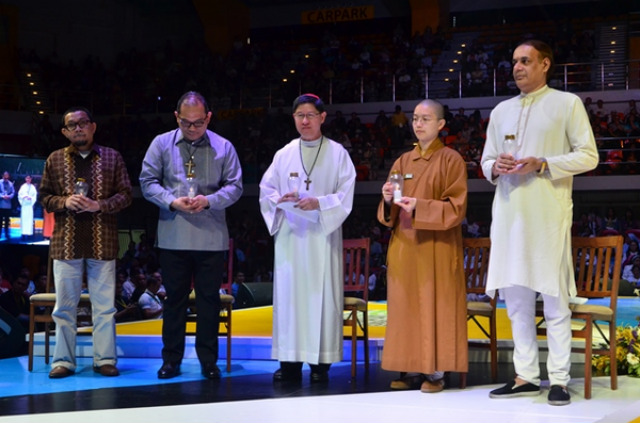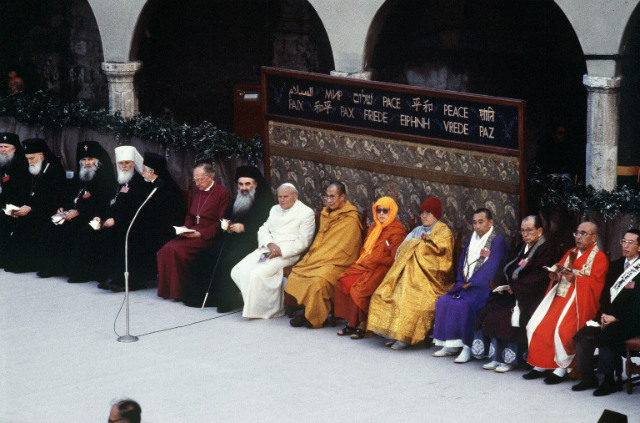SUMMARY
This is AI generated summarization, which may have errors. For context, always refer to the full article.

MANILA, Philippines – In a sea of over 5,000 Catholics as well as members of various faiths, more than a dozen Buddhists went up the stage.
Their leader, the Venerable Abbess Miao Jing, took the microphone. “We come together to make a change.”
She said: “We may come from different backgrounds and thinkings, just like this bouquet of flowers. Some are red, some are white, some are green – the leaves.”
“But when we come together,” the abbess explained, “it is this bouquet of flowers bringing love to this human world.”
Before Miao Jing, a Muslim and an Evangelical Christian took center stage; after her, a Hindu and a Catholic.
At the University of Santo Tomas, representatives of various religions gathered last October 18 for a two-hour interfaith event organized by Manila Archbishop Luis Antonio Cardinal Tagle.
The event reenacted the World Day of Prayer in Assisi, Italy on Oct 27, 1986, a historic gathering of world religions that was convened by the late Pope John Paul II.
The Assisi gathering marks its 27th anniversary on Sunday, October 27.
‘Like a hand’
Miao Jing continued: “We may come from a wide variety of cultures, just like this hand – fingers and thumbs. Each has its strength and talents, but when we work together, it is this hand that brings harmony to the world.”
Then, the abbess led a chant for the victims and survivors of the 7.2-magnitude earthquake that killed over 200 in the Visayas. (READ: Visayas quake death toll climbs to 213.)
Earlier that day, Julkipli Wadi, dean of the University of the Philippines Institute of Islamic Studies, explained the importance of the Assisi program, especially under the papacy of Francis.
Wadi quoted Francis, who said, “It is important to intensify dialogue among various religions, and I am thinking particularly of dialogue with Islam.”
The dean explained: “When Pope Francis particularized Islam as one of the Vatican’s dialogue partners, like Buddhism, Hinduism, and so on, the more the Assisi program gains relevance in our time, given the imperative with relatively similar inter-religious projects.”

‘Can sorry be enough?’
Evangelical Bishop Cesar Punzalan, for his part, emphasized Jesus’ commandment to love.
“A way to obey Jesus’ commandments is through learning and practicing the gift of forgiveness – daily,” said Punzalan, chairman of the board of the Philippine Council of Evangelical Churches.
Punzalan noted conflicts “with people of other living faiths,” among others, using “the power of the law, the power of money, the power of doctrine.”
The challenge, he said, is “to build bridges across the many divides that we can think of.”
“We live in a culture of love, and that is only possible if forgiveness is the main cultural value of his disciples,” Punzalan said.
Maharaj Rajesh Sharma, a Hindu priest, also stressed the importance of forgiving “unconditionally.”
He said: “We knowingly or unknowingly hurt others by our words and attitudes. Casually we say ‘sorry,’ ‘pardon me,’ and at times, we greet every friend and relative with a request to forgive us for knowingly or unknowingly being hurt. Is it enough? Can ‘sorry’ be enough? Does ‘sorry’ give us a license to do another mistake? Or ‘sorry’ teaches us something?”
The Hindu priest added, “It is not easy to forgive someone if we have never given forgiveness.”
‘Who is my neighbor?’
Briefly, Tagle capped the program by emphasizing forgiveness and love. He also apologized for the sins of the Catholic Church. (READ: Tagle says sorry for sins of Church.)
Tagle explained that forgiveness is not only a gift from God, but also a mission, “even a condition for the gift.” “We have been forgiven,” the cardinal said. “Can we not proclaim that forgiving love that we have experienced from God?”
He added: “Love – all of us long for love – but whom to love? The whole question of ‘the other’ – it is easy to love those whom we consider our own.”
“Who is my neighbor? Oh, if my neighbor is my family and those who agree with me, there is no need to command love. But whom do we love? Then Jesus says, love everyone, even your enemies, even those who persecute you. No one is exempt from love.”
Mimicking a face of exasperation, the cardinal joked: “Hay naku!” (My goodness!)
“Then we need grace again,” a smiling Tagle said. “Teach us how to love.” – Rappler.com
Add a comment
How does this make you feel?
There are no comments yet. Add your comment to start the conversation.